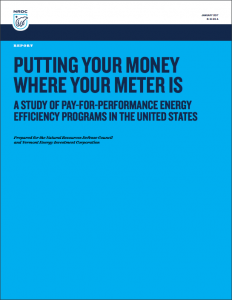Full Title: Putting Your Money Where Your Meter Is: A Study Of Pay-For-Performance Energy Efficiency Programs In The United States
Author(s): Julia Szinai, Merrian Borgeson, & Emily Levin
Publisher(s): Natural Resources Defense Council
Publication Date: January 1, 2017
Full Text: Download Resource
Description (excerpt):
Decreasing energy consumption by making buildings more energy efficient can avoid the construction of new power plants, reduce grid infrastructure costs, and lower carbon emissions—in addition to saving customers money on their energy bills. Most leading states offer energy efficiency (EE) programs that encourage lower energy usage to achieve these significant public benefits. Many of these programs provide customers an incentive payment for installing energy-efficient equipment (a type of EE measure), estimating (or “deeming”) future savings on the basis of detailed technical analyses and the results of efficiency evaluations. This approach has served efficiency programs well for years—and in many sectors will continue to play a vital role in the future. However, the need to further ramp up EE to avoid greenhouse gas emissions from energy generation, along with an interest in better use of digital energy meter data and analytics to encourage efficiency, has led policymakers in states like California and New York to consider expanding the use of pay-for-performance, or P4P, EE programs. P4P programs reward energy savings on an ongoing basis as the savings occur, often by examining data from a building’s energy meters, rather than providing up-front payments to fund energy-saving measures. Pay for performance has been suggested to be, and is examined in this report, a way to increase those savings, and their persistence over time, while stimulating innovation in the efficiency programs that help deliver them.
